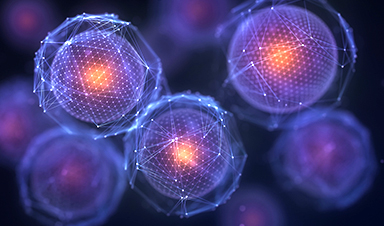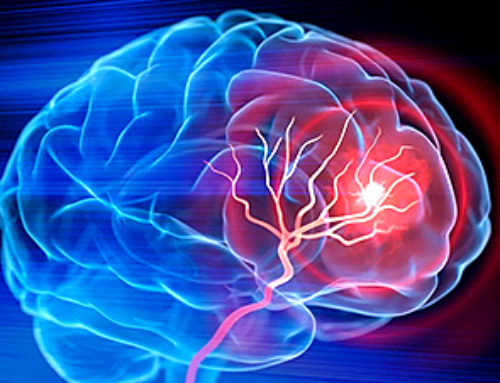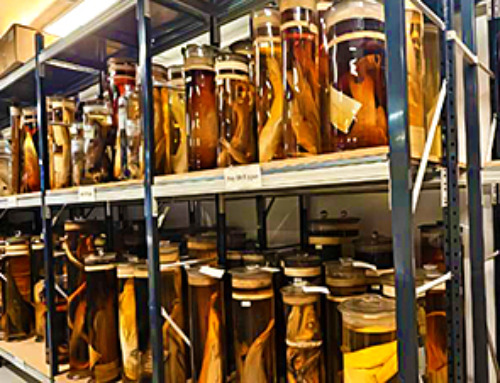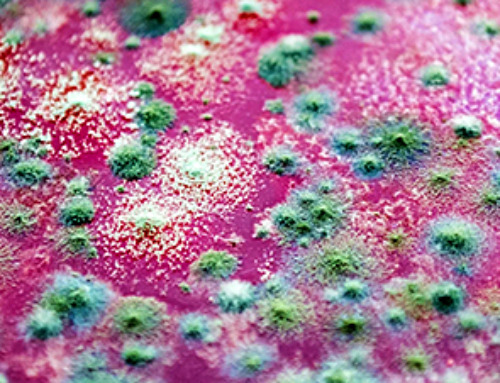Within a newborn’s umbilical cord lie potentially life-saving stem cells that can be used to fight diseases like lymphoma and leukemia. That is why many new parents elect to store (“bank”) their infant’s stem cell-rich umbilical cord blood. But in the 6–15% of pregnancies affected by gestational diabetes, parents lack this option because the condition damages the stem cells and renders them useless.
At the heart of this new approach are specially engineered nanoparticles. At just 150 nanometers in diameter—about a quarter of the size of a red blood cell—each spherical nanoparticle is able to store medicine and deliver it just to the stem cells themselves by attaching directly onto the stem cells’ surface. Due to their special formulation or “tuning,” the particles release the medicine slowly, making it highly effective even at very low doses.
Donny Hanjaya-Putra, an assistant professor of aerospace and mechanical engineering in the bioengineering graduate program at Notre Dame who directs the lab where the study was conducted, described the process using an analogy. “Each stem cell is like a soldier. It is smart and effective; it knows where to go and what to do. But the ‘soldiers’ we are working with are injured and weak. By providing them with this nanoparticle ‘backpack,’ we are giving them what they need to work effectively again.”
The main test for the new “backpack”-equipped stem cells was whether or not they could form new tissues. Hanjaya-Putra and his team tested damaged cells without “backpacks” and observed that they moved slowly and formed imperfect tissues. But when Hanjaya-Putra and his team applied “backpacks,” previously damaged stem cells began forming new blood vessels, both when inserted in synthetic polymers and when implanted under the skin of lab mice, two environments meant to simulate the conditions of the human body.
Although it may be years before this new technique reaches actual health care settings, Hanjaya-Putra explained that it has the clearest path of any method developed so far. “Methods that involve injecting the medicine directly into the bloodstream come with many unwanted risks and side effects,” Hanjaya-Putra said. In addition, new methods like gene editing face a long journey to Food and Drug Administration (FDA) approval. But Hanjaya-Putra’s technique used only methods and materials already approved for clinical settings by the FDA.
Hanjaya-Putra attributed the study’s success to a highly interdisciplinary group of researchers. “This was a collaboration between chemical engineering, mechanical engineering, biology and medicine—and I always find that the best science happens at the intersection of several different fields.”
The study’s lead author was former Notre Dame postdoctoral student Loan Bui, now a faculty member at the University of Dayton in Ohio; stem cell biologist Laura S. Haneline and former postdoctoral fellow Shanique Edwards from the Indiana University School of Medicine; Notre Dame Bioengineering doctoral students Eva Hall and Laura Alderfer; Notre Dame undergraduates Pietro Sainaghi, Kellen Round and 2021 valedictorian Madeline Owen; Prakash Nallathamby, research assistant professor, aerospace and mechanical engineering; and Siyuan Zhang from the University of Texas Southwestern Medical Center.
The researchers hope their approach will be used to restore cells damaged by other types of pregnancy complications, such as preeclampsia. “Instead of discarding the stem cells,” Hanjaya-Putra said, “in the future we hope clinicians will be able to rejuvenate them and use them to regenerate the body. For example, a baby born prematurely due to preeclampsia may have to stay in the NICU with an imperfectly formed lung. We hope our technology can improve this child’s developmental outcomes.”
News
Plant Discovery Could Transform How Medicines Are Made
Scientists have uncovered an unexpected way plants make powerful chemicals, revealing hidden biological connections that could transform how medicines are discovered and produced. Plants produce protective chemicals called alkaloids as part of their natural [...]
Scientists Develop IV Therapy That Repairs the Brain After Stroke
New nanomaterial passes the blood-brain barrier to reduce damaging inflammation after the most common form of stroke. When someone experiences a stroke, doctors must quickly restore blood flow to the brain to prevent death. [...]
Analyzing Darwin’s specimens without opening 200-year-old jars
Scientists have successfully analyzed Charles Darwin's original specimens from his HMS Beagle voyage (1831 to 1836) to the Galapagos Islands. Remarkably, the specimens have been analyzed without opening their 200-year-old preservation jars. Examining 46 [...]
Scientists discover natural ‘brake’ that could stop harmful inflammation
Researchers at University College London (UCL) have uncovered a key mechanism that helps the body switch off inflammation—a breakthrough that could lead to new treatments for chronic diseases affecting millions worldwide. Inflammation is the [...]
A Forgotten Molecule Could Revive Failing Antifungal Drugs and Save Millions of Lives
Scientists have uncovered a way to make existing antifungal drugs work again against deadly, drug-resistant fungi. Fungal infections claim millions of lives worldwide each year, and current medical treatments are failing to keep pace. [...]
Scientists Trap Thyme’s Healing Power in Tiny Capsules
A new micro-encapsulation breakthrough could turn thyme’s powerful health benefits into safer, smarter nanodoses. Thyme extract is often praised for its wide range of health benefits, giving it a reputation as a natural medicinal [...]
Scientists Develop Spray-On Powder That Instantly Seals Life-Threatening Wounds
KAIST scientists have created a fast-acting, stable powder hemostat that stops bleeding in one second and could significantly improve survival in combat and emergency medicine. Severe blood loss remains the primary cause of death from [...]
Oceans Are Struggling To Absorb Carbon As Microplastics Flood Their Waters
New research points to an unexpected way plastic pollution may be influencing Earth’s climate system. A recent study suggests that microscopic plastic pollution is reducing the ocean’s capacity to take in carbon dioxide, a [...]
Molecular Manufacturing: The Future of Nanomedicine – New book from Frank Boehm
This book explores the revolutionary potential of atomically precise manufacturing technologies to transform global healthcare, as well as practically every other sector across society. This forward-thinking volume examines how envisaged Factory@Home systems might enable the cost-effective [...]
New Book! NanoMedical Brain/Cloud Interface – Explorations and Implications
New book from Frank Boehm, NanoappsMedical Inc Founder: This book explores the future hypothetical possibility that the cerebral cortex of the human brain might be seamlessly, safely, and securely connected with the Cloud via [...]
Global Health Care Equivalency in the Age of Nanotechnology, Nanomedicine and Artificial Intelligence
A new book by Frank Boehm, NanoappsMedical Inc. Founder. This groundbreaking volume explores the vision of a Global Health Care Equivalency (GHCE) system powered by artificial intelligence and quantum computing technologies, operating on secure [...]
Miller School Researchers Pioneer Nanovanilloid-Based Brain Cooling for Traumatic Injury
A multidisciplinary team at the University of Miami Miller School of Medicine has developed a breakthrough nanodrug platform that may prove beneficial for rapid, targeted therapeutic hypothermia after traumatic brain injury (TBI). Their work, published in ACS [...]
COVID-19 still claims more than 100,000 US lives each year
Centers for Disease Control and Prevention researchers report national estimates of 43.6 million COVID-19-associated illnesses and 101,300 deaths in the US during October 2022 to September 2023, plus 33.0 million illnesses and 100,800 deaths [...]
Nanomedicine in 2026: Experts Predict the Year Ahead
Progress in nanomedicine is almost as fast as the science is small. Over the last year, we've seen an abundance of headlines covering medical R&D at the nanoscale: polymer-coated nanoparticles targeting ovarian cancer, Albumin recruiting nanoparticles for [...]
Lipid nanoparticles could unlock access for millions of autoimmune patients
Capstan Therapeutics scientists demonstrate that lipid nanoparticles can engineer CAR T cells within the body without laboratory cell manufacturing and ex vivo expansion. The method using targeted lipid nanoparticles (tLNPs) is designed to deliver [...]
The Brain’s Strange Way of Computing Could Explain Consciousness
Consciousness may emerge not from code, but from the way living brains physically compute. Discussions about consciousness often stall between two deeply rooted viewpoints. One is computational functionalism, which holds that cognition can be [...]





















